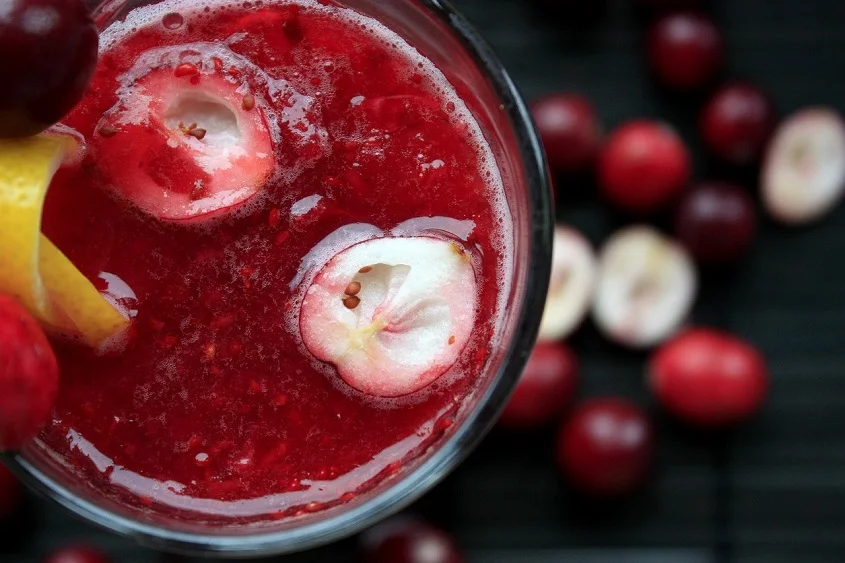Is Cranberry Juice Good for Kidney Stones?
- Updated on: Dec 23, 2023
- 5 min Read
- Published on Dec 23, 2023

Kidney stones, small, hard deposits that form in the kidneys, can be an extremely painful and bothersome condition. The discomfort they cause often prompts individuals to seek various remedies and preventive measures. One such remedy that has gained attention is cranberry juice. Known for its tart flavor and potential health benefits, cranberry juice is often touted as a natural solution for kidney stones. In this article, we will explore the relationship between cranberry juice and kidney stones, examining both the potential benefits and any considerations that individuals should be aware of.
Understanding Kidney Stones
Before delving into the cranberry juice-kidney stones connection, it’s essential to understand the nature of kidney stones. Kidney stones are solid crystals formed from substances in urine, such as calcium, oxalate, and phosphorus. When these substances are present in high concentrations, they can crystallize and clump together, forming stones. The size and composition of kidney stones can vary, and the symptoms they cause include severe pain, blood in urine, and discomfort during urination.
Cranberry Juice Composition
Cranberry juice is derived from the berries of the cranberry plant (Vaccinium macrocarpon). Packed with nutrients and antioxidants, cranberries are known for their potential health benefits. The juice is rich in vitamin C, fiber, and various phytochemicals. However, when it comes to kidney stones, the focus often turns to certain compounds found in cranberries, such as proanthocyanidins and quinic acid.

Is it advisable for individuals with kidney stones to consume cranberry juice?
The question of whether individuals with kidney stones should consume cranberry juice remains a topic of debate, with conflicting research contributing to the uncertainty. Numerous studies on the potential relationship between cranberry juice and kidney stones exist, but the mixed findings necessitate further investigation to establish a clearer understanding.
Oxalates and Calcium Oxalate Kidney Stones
Cranberry juice is known for its high oxalate content, a factor that could potentially elevate the risk of developing calcium oxalate kidney stones. The mechanism behind this is the binding of oxalates to calcium, which is particularly problematic for individuals already predisposed to kidney stones.
Research Insights on Citric Acid and Urine pH
Older studies have presented conflicting evidence regarding the impact of cranberry juice on urinary citric acid excretion, a factor relevant to kidney stone development. While one study found a decrease in citric acid levels, another did not observe any significant effect.
Moreover, there is an indication that cranberry juice may lower the pH of urine, rendering it more acidic. The increased acidity poses a potential risk for the development of calcium oxalate and uric acid stones. A recent review even suggested that cranberry juice could heighten the relative supersaturation risk (RSR) associated with calcium oxalate and uric acid stones, with the RSR serving as a measure of kidney stone risk.
Divergent Effects on Stone Types
Interestingly, cranberry juice exhibited contrasting effects on different types of stones. It increased RSR for calcium oxalate and uric acid stones but decreased RSR scores for brushite and struvite stones, primarily due to their reduced likelihood of forming in acidic environments. This discrepancy emphasizes the complexity of the relationship between cranberry juice and kidney stone formation.
Conflicting Study Results
Adding to the complexity, an older study contradicted the prevailing notion by finding that cranberry juice decreased RSR for calcium oxalate stones and increased urinary pH. Such conflicting outcomes underscore the need for more comprehensive research to draw definitive conclusions.
Considerations and Recommendations
Considering the current body of research, it appears that the effects of cranberry juice may depend on the type of kidney stones an individual is prone to developing. For those susceptible to calcium oxalate and uric acid stones, exercising caution and potentially limiting or avoiding cranberry juice consumption might be prudent.
Furthermore, the lack of data comparing the effects of 100% cranberry juice versus processed cranberry beverages on kidney stone formation adds another layer of complexity. Opting for 100% juice, free from added sugars and other undesirable ingredients, seems to be a reasonable choice.
Potential Benefits of Cranberry Juice for Kidney Stones
Increased Fluid Intake: One of the primary recommendations for preventing and managing kidney stones is staying well-hydrated. Adequate fluid intake helps dilute urine, reducing the concentration of minerals and substances that contribute to stone formation. Cranberry juice, like water, can contribute to overall fluid intake, potentially promoting hydration and aiding in the prevention of kidney stones.
Acidification of Urine: Cranberry juice is known for its acidic nature, primarily due to the presence of quinic acid. Some studies suggest that acidic urine may inhibit the formation of certain types of kidney stones, such as calcium oxalate stones. The acidification of urine is thought to make it more difficult for crystals to form and aggregate, potentially hindering the development of stones.
Antioxidant Properties: Cranberries are rich in antioxidants, which may have anti-inflammatory properties. Inflammation is believed to play a role in the formation and growth of kidney stones. By reducing inflammation, antioxidants in cranberry juice may contribute to a healthier urinary system, potentially reducing the risk of kidney stone development.
It’s important to note that while these potential benefits exist, individual responses to cranberry juice can vary, and considerations such as sugar content and oxalate levels should be taken into account based on an individual’s health profile and stone composition. Consulting with healthcare professionals for personalized advice is recommended.
Considerations and Caveats
While cranberry juice may offer some potential benefits in the context of kidney stones, it’s crucial to consider certain factors and limitations:
Sugar Content: Many commercially available cranberry juices contain added sugars to balance the tartness of the fruit. Excessive sugar intake can contribute to obesity and metabolic conditions, which may, in turn, increase the risk of kidney stones. Individuals seeking the potential benefits of cranberry juice should opt for unsweetened varieties or consider consuming fresh, whole cranberries.
Oxalate Content: Cranberries, like many fruits, contain oxalates. In some cases, kidney stones are composed of calcium oxalate. While the relationship between dietary oxalates and kidney stone formation is complex, individuals with a history of calcium oxalate stones may need to monitor their oxalate intake. In such cases, moderation in cranberry juice consumption is advised.
Individual Variability: The response to cranberry juice can vary among individuals. What works for one person may not have the same effect on another. Factors such as overall health, diet, and the specific type of kidney stones an individual is prone to can influence the effectiveness of cranberry juice as a preventive measure.
Consultation with Healthcare Professionals: Before making significant changes to one’s diet or adopting cranberry juice as a preventive measure for kidney stones, it is advisable to consult with a healthcare professional. They can provide personalized advice based on an individual’s medical history, risk factors, and overall health.
FAQs
Is Cranberry Juice Effective for Preventing Kidney Stones?
Explore the potential benefits of cranberry juice, including increased fluid intake and urine acidification. Understand the caution warranted due to conflicting research.
What Compounds in Cranberry Juice Affect Kidney Stones?
Delve into the composition of cranberry juice, focusing on compounds like proanthocyanidins and quinic acid, and their potential impact on kidney stones.
Should Individuals with Kidney Stones Consume Cranberry Juice?
Understand the ongoing debate surrounding the advisability of consuming cranberry juice for individuals with kidney stones, considering conflicting research findings.
How Does Cranberry Juice Affect Different Types of Kidney Stones?
Explore the divergent effects of cranberry juice on various types of stones, including increased relative supersaturation for some and decreased scores for others.
What Are the Considerations and Recommendations for Cranberry Juice Consumption?
Gain insights into considerations such as oxalate content, sugar intake, and individual variability. Learn about recommendations for making informed choices regarding cranberry juice and kidney stones.












